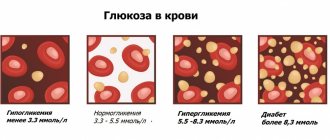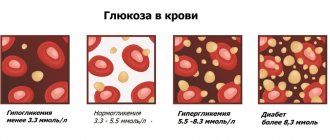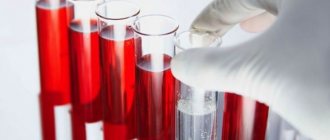HCG (human chorionic gonadotropin) is a hormone released during pregnancy. Using a laboratory blood test, the concentration of beta subunits is determined. Conception can be detected using this method as early as 6-8 days. The hCG test also differentiates a normal pregnancy from an ectopic one. The online hCG calculator will help you decipher the blood test. You will be able to track the dynamics of hormone growth indicators and be able to determine the duration of pregnancy.
APPOINTMENT WITH A GYNECOLOGIST - 1000 rubles. CONSULTATION WITH A GYNECOLOGIST ON THE RESULTS OF AN ULTRASOUND AND ANALYSIS - RUB 500!
CLICK TO SIGN UP
What is hCG - “beta”?
The content of the article
HCG is a hormone that is produced by the fetus itself, or rather by the fetal membrane of the embryo (chorion). The process begins immediately when the embryo is implanted into the uterus. At this moment, the fetus still looks like a small bubble of liquid, consisting of an embryoblast (from which the fetus will form in the future) and trophoblast (cells that form the chorion).
Under the influence of gonadotropin, the corpus luteum produces hormones that maintain the condition of the endometrium (the inner lining of the uterus) necessary for normal pregnancy. An increase in hCG concentration indicates that fertilization has taken place.
HCG contains:
- Alpha subunits. They are not determined because they have no diagnostic value during pregnancy.
- Beta subunits, which make it possible to determine the fact of conception and the period of fetal development.
That is why the term human chorionic gonadotropin in pregnancy tests refers to its beta component.
Free hCG
Free hCG is used in first and second trimester screening to diagnose and monitor fetal abnormalities. In addition to screening tests, the pregnant woman undergoes an ultrasound. In the first trimester, from weeks 10 to 12, a “double test” is performed, in which free hCG is tested together with PAPP-A (pregnancy-associated plasma protein A). First trimester screening is carried out to identify chromosomal abnormalities in the fetus: trisomy 21 (Down syndrome) and trisomy 18 (Edwards syndrome). Second trimester screening is a “triple test” that includes free estriol (E3), alpha-fetoprotein (AFP) and hCG. Second trimester screening also examines the manifestation of fetal developmental abnormalities. AFP analysis with hCG is carried out at 15-20 weeks, since earlier the level of AFP concentration in the blood is not reliable. The ratios of these indicators are used as an indicator of pathologies.
The risk of developing an anomaly is calculated using the deviation of indicators from the average values for a given period of pregnancy (for example, AFP and hCG) - MoM (multiple of the median). Pathology is determined by a combination of indicators (PAPP-A, AFP, E3, hCG) MoM. Such combinations are called MoM profiles. The norm, regardless of the indicators (PAPP-A, AFP, E3, hCG), MoM ranges from 0.5 to 2.5. For example, the analysis showed a beta-hCG value at week 7 of 60,000 mU/ml, the median of this period was 70,000 (the median can be viewed in the hCG table). HCG MoM = 60000/70000 = 0.85, which is not outside the normal range. An hCG calculator will help you calculate the result correctly.
How do hCG levels change during pregnancy?
For the first time, an increase in beta-hCG levels is detected starting from the sixth day after conception. At first, the concentration of the hormone doubles every two days. Further, the increase in hCG concentration slows down and when the level reaches 1200 mU/ml, doubling begins to occur every 72-96 hours. Upon reaching 6000 mU/ml, growth occurs every 96 hours.
The concentration indicator is not just boring numbers: it is what helps determine the gestational age.
After 11 weeks, the hormone in the body becomes less, but its level is still increased. At 34 weeks, a second increase in hCG occurs. This surge, according to scientists, triggers labor. After childbirth, the level of beta-hCG in the blood gradually decreases.
More details hCG
{banner_banstat0}
Human chorionic hormone is of protein origin and belongs to the classification of glycoproteins. The structure of hCG includes two complex chains: alpha and beta. The alpha chain is similar in structure to other female hormones, such as FSH, TSH, LH. For diagnostic purposes, the beta chain is of interest. It is endowed with a unique arrangement of more than 200 amino acids. It is the study of beta subunits that allows one to confirm or refute the presence of pregnancy and make other diagnoses.
HCG has an important mission in the body:
- Promote the accelerated production of estrogen and progesterone in a pregnant woman.
- Prepare the immune system of the expectant mother for the acceptance and development of the fetus.
- In a child in the womb, the activity of the adrenal glands and sex secretion glands is activated.
- Induce the formation of cells that produce testosterone in a male embryo.
Human chorionic gonadotropin begins to be produced from the first hours of conception by the syncytial (superficial) layer of the trophoblast of the fetal egg. Then, having attached to the wall of the uterus, hCG begins to actively participate in the formation of the placenta. The first chorionic hormones penetrate into the bloodstream closer to the week of pregnancy.
Therefore, if it is necessary to verify the fact of conception, blood test for hCG provides earlier and more accurate results than urine.
Popular pharmacy test strips determine the fact of pregnancy only after the expected period is missed. The express test is also based on identifying the numerical value of hCG, but not in the blood, but in the urine. Often this method of diagnosing pregnancy shows a weak positive, false positive or false negative response. For this reason, testing for hCG in the blood has undeniable advantages over other diagnostic methods.
Online hCG calculator
The calculator will help you when deciphering blood tests for hCG. You will be able to monitor the growth dynamics of Beta-hCG and determine the duration of pregnancy.
The results indicated in the tables and the hCG calculator itself are approximate. To determine this hormone, various methods can be used and indicators may vary. Therefore, the analysis is deciphered where it was done. The units of measurement for the concentration of beta-hCG are also different. The concentration is indicated in honey/ml, mIU/ml, U/l and IU/l as well as U/l mIU/ml, IU/l. All indicators are the same and do not need to be recalculated. U stands for units, IU stands for international units, mIU/ml and U/l are the English display of units.
Normal hCG levels
{banner_banstat1}
In pregnant women, hCG increases rapidly, adding impressive levels every seven days until the 10th week. After which the values stabilize, and even a systematic decrease in hCG levels can be observed, which occurs until the 39th week. The data table for chorionic hormone in a woman during pregnancy clearly demonstrates this process.
Table of hCG values during pregnancy:
| Weeks of pregnancy | Numerical range of hCG expressed in mU/ml |
| From 1st to 2nd week | 27–154 |
| From 2nd to 3rd week | 102–4860 |
| From 3rd to 4th week | 1110–31380 |
| From 4th to 5th week | 2560–82280 |
| From 5th to 6th week | 23075–150974 |
| From 6th to 7th week | 27285–232940 |
| From 7th to 10th week | 21050–290970 |
| From 11th to 15th week | 6170–102985 |
| From 16th to 20th week | 4760–80087 |
| From 21st to 39th week | 2685–78075 |
The hCG rate in the body of a healthy man or a non-pregnant woman should not exceed 5 mU/ml. This category of citizens may not have chorionic hormone at all, that is, the result of an hCG analysis in the blood may show a zero value. Moreover, hCG should be present in the male body in small quantities up to 2–2.5 mU/ml, as it stimulates the production of sex hormones and sperm.
Beta-hCG levels at different stages of pregnancy
| Days after last menstruation | Gestation period (days/weeks) | HCG in honey/ml |
| 26 | 12 | 0-50 |
| 27 | 13 | 25-100 |
| 28 | 14 (2 weeks) | 50-100 |
| 29 | 15 | 100-200 |
| 30 | 16 | 200-400 |
| 31 | 17 | 400-1000 |
| 32 | 18 | 1050-3000 |
| 33 | 19 | 1450-4000 |
| 34 | 20 | 1940-5000 |
| 35 | 21 (3 weeks) | 2600-6500 |
| 36 | 22 | 3400-8500 |
| 37 | 23 | 4400-10800 |
| 38 | 24 | 5700-13700 |
| 39 | 25 | 7200-17000 |
| 40 | 26 | 9000-21000 |
| 41 | 27 | 10100-23300 |
| 42 | 28 (4 weeks) | 11200-2550 |
| 43 | 29 | 13700-30900 |
| 44 | 30 | 16600-36500 |
| 45 | 31 | 19900-43000 |
| 46 | 32 | 25500-50200 |
| 47 | 33 | 27450-57650 |
| 48 | 34 | 31700-65400 |
| 49 | 35 (5 weeks) | 36100-73200 |
| 50 | 36 | 40700-81150 |
| 51 | 37 | 45300-88800 |
| 52 | 38 | 49800-96000 |
| 53 | 39 | 54100-102500 |
| 54 | 40 | 58200-108200 |
| 55 | 41 | 61640-112800 |
| 56 | 42 (6 weeks) | 64000-116310 |
Concentration of chorionic gonadotropin at later stages
| Duration in weeks | HCG concentration honey/ml |
| 7 | 65000 – 155000 |
| 8 | 67500 – 190000 |
| 9-10 | 70000 – 211000 |
| 11-12 | 13500 – 63000 |
| 13-14 | 1200 – 71000 |
| 15-25 | 8000 – 60000 |
| 26-37 | 5000 – 55000 |
Why is a beta-hCG blood test more sensitive than a drugstore test?
Pregnancy tests are not accurate for the following reasons:
- The concentration of hCG in urine is almost two times lower than in the blood, so even the most sensitive test will give a false negative result in the early stages.
- Human chorionic gonadotropin tests sold in pharmacies are capricious and may not work correctly. Reasons: inaccurate analysis, expired reagent, improper storage of the test.
- If you drink a lot of water in the evening or take a diuretic, the test will not detect pregnancy. Tests also give false negative results for kidney diseases.
Every year there are thousands of mothers in the world who for a long time did not imagine their “interesting situation”, trusting pharmacy strips.
HCG when to take
In women, the indications for donating blood to determine the level of hCG are the following diseases and conditions of the female body:
- dysmenorrhea and amenorrhea;
- early stages of pregnancy;
- suspected tubal pregnancy;
- the need to assess the completeness of surgical termination of pregnancy;
- for dynamic monitoring of the course of pregnancy;
- presence of signs of threatened miscarriage and non-developing pregnancy;
- for the purpose of diagnosing trophoblastic diseases such as chorionepithelioma and hydatidiform mole;
- screening for the effectiveness of therapy for trophoblastic diseases;
- for dynamic monitoring of the patient after suffering a trophoblastic disease;
- for prenatal diagnosis of congenital malformations of the fetus;
- for the purpose of differential diagnosis of malignant neoplasms of the testes in men.
In order for the results of the study to judge the state of the body, it is necessary to prepare for the study. The hCG level will reflect the true state of affairs only when blood is donated for testing on an empty stomach. This method of diagnosing early pregnancy is extremely sensitive and allows you to diagnose pregnancy on the first or second day of a missed period. Women have individual differences in the rate of hCG synthesis, therefore, if the question arises when to donate hCG, the correct answer will be this: it is better to donate blood no earlier than the third or fifth day of a missed period. Otherwise, the test results may be false negative.
If the results of the study are in doubt, then the hCG analysis should be repeated after two or three days. The analysis period is one day. In cases where the purpose of the study is to determine the completeness of an abortion or removal of an ectopic pregnancy, an hCG analysis is performed two days after the operation. This eliminates false positive results.
Blood serum is used to analyze hCG on a daily basis. The analysis is completed within one day. In order to get correct results, a woman on the eve of donating blood should avoid excessive physical activity and not drink alcohol.
How is a human chorionic gonadotropin test taken?
For the analysis, blood from a vein is needed in the morning on an empty stomach. Measurement of beta-hCG concentration is performed no earlier than 3-5 days after a missed period. When taking hormones, you need to inform your doctor about this - they can affect the concentration of hCG.
To diagnose congenital pathologies (perinatal screening), an hCG test is performed at 14-18 weeks. Determination of hCG in men and non-pregnant women (analysis for tumor markers) can be carried out on any day.
Interpretation of hCG readings in pregnant women
{banner_banstat3}
HCG analysis and interpretation among women registered during pregnancy may show increased and decreased levels of human chorionic gonadotropin. Both clinical conditions are very dangerous for both the pregnant woman and the child in the womb. Deciphering the hCG analysis, that is, an increase or decrease in the value of chorionic hormone should occur taking into account the standards established for each individual period of gestation. A reduced hCG ratio in the blood of women during pregnancy does not bode well.
A decrease in chorionic hormone levels in pregnant women may indicate the following pathologies:
- Ectopic fertilization.
- Threat of spontaneous miscarriage.
- Incorrect development or freezing of the embryo.
- Overmaturity of the child due to prolongation of the gestation period.
- Fetoplacental insufficiency.
An increased level of hCG in the blood of women preparing to become mothers occurs:
- From the use of gestagens.
- When bearing several fruits.
- If the pregnancy date is incorrectly stated.
- If a woman has diabetes.
- If there is a possibility of a chromosomal abnormality of the fetus.
- When pregnancy is delayed beyond 42 weeks.
- When a severe degree of toxicosis develops, which threatens complications in the form of impaired renal function (nephropathy), and as a result, severe swelling. And in addition they threaten with weight gain and high blood pressure.
In addition, a complicated condition of gestosis, called eclampsia, is dangerous due to the appearance of convulsive seizures. If a course of therapy is not carried out in a timely manner, the consequences can be disastrous - the death of the mother or child. In view of this, pregnant women are usually recommended to regularly test for hCG. Monitoring the level of the main hormone of pregnancy will help maintain the condition of the woman in pregnancy and the fetus in a normal state.
The concentration of beta-hCG is different from the norm, what does this mean?
The online hCG calculator only works to determine pregnancy. If pregnancy is not confirmed and there are no other signs of pregnancy, you need to make an appointment with an oncologist. An increase in the hCG hormone can occur in both non-pregnant women and men. This indicates malignant tumors of the uterus (chorionepithelioma, chorionic carcinoma) or testicles. An increase in the hormone is also observed in cancer of the bladder, kidneys, intestines, and lungs.
| Excess hCG | Decreased hCG |
| Multiple pregnancy. In case of twins or triplets, the level is proportional to the number of embryos | Risk of miscarriage |
| Toxicosis | Death of an embryo or fetus |
| Down syndrome (more research needed) | Frozen pregnancy |
| The term is incorrectly defined | Placental insufficiency |
| Post-term pregnancy | |
| Ectopic pregnancy | |
| Hydatidiform mole | |
| Pregnancy after stimulation or IVF |
If a high level of hCG persists after an abortion, this indicates an incomplete abortion - incomplete removal of the fertilized egg or an ongoing pregnancy. Gonadotropin levels also increase when taking hormonal medications.
HCG (human chorionic gonadotropin) is one of the main pregnancy hormones. It is produced by chorion cells (the membrane of the embryo) from the first week after the attachment of the embryonic egg in the uterus. That is, already approximately in the third week from the beginning of the menstrual cycle (naturally, if ovulation occurred on time - on the 14th day, and did not shift “later”), if pregnancy has taken place, an increased level of the hCG hormone can be detected in the mother’s blood.
By the way, the effect of conventional pregnancy tests is based precisely on determining the presence of this hormone in a woman’s urine. True, hCG is first detected in the blood - and only then its concentration in the urine begins to increase. Therefore, sometimes the presence of pregnancy can be determined solely with the help of a blood test - for example, when the missed period still seems to be far away. Throughout the first trimester of pregnancy, hCG has a stimulating effect on the production of the hormones progesterone, estradiol and free estriol, which are necessary for the development of pregnancy, and also supports yellow body. During the first weeks of a successful pregnancy, the hCG level doubles every two days. If the pregnancy is multiple, the hCG content increases in proportion to the number of fetuses.
The maximum concentration of hCG is observed at 9–11 weeks of pregnancy, after which the level of hCG slowly decreases. At the end of the first trimester, when the necessary hormones begin to be produced by the fetus-placenta system, the hCG level begins to decrease and the entire second trimester remains at approximately the same concentration.
| The most important The determination of hCG is most often used either to establish the fact of pregnancy and monitor its development, or (much less often) to determine the presence of certain tumors that secrete this substance. When diagnosing pregnancy, detection of hCG within the range typical for healthy non-pregnant women (i.e. up to 5) indicates the absence of pregnancy. It should be borne in mind that if hCG is taken too early, it may turn out to be false negative. Therefore, if there are other signs of pregnancy and hCG is not elevated, the test must be repeated after a few days. |
HCG norms
| Normal serum hCG levels Unit: mIU/ml | |
| Men Non-pregnant women | 0—2,5 0 – 5,3 |
| Pregnant women: | |
| 1.3 – 2 weeks of pregnancy | 16—156 |
| 2-3 weeks of pregnancy | 101—4,870 |
| 3-4 weeks of pregnancy | 1,110—31,500 |
| 4-5 weeks of pregnancy | 2,560—82,300 |
| 5-6 weeks of pregnancy | 23,100—151,000 |
| 6-7 weeks of pregnancy | 27,300—233,000 |
| 7-11 weeks of pregnancy | 20,900—291,000 |
| 11-16 weeks of pregnancy | 6,140—103,000 |
| 16-21 weeks of pregnancy | 4,720—80,100 |
| 21–39 weeks of pregnancy | 2,700—78,100 |
An hCG level ranging from 5 to 25 mU/ml does not allow one to reliably confirm or refute pregnancy, so a repeat test is required after 2 days.
Need to know! These hCG norms are indicated as approximate for the duration of pregnancy “FROM CONCEPTION” (and not for the duration of the last menstruation). The above figures are not a generally accepted standard! Each laboratory may have its own standards. To correctly evaluate the result of the analysis, rely on the standards of the laboratory where you performed this analysis!
If the hCG level is different from normal
HCG levels during pregnancy are higher than normal in the following cases:
- if the pregnancy is multiple (the hCG level increases in proportion to the number of fetuses);
- if the actual gestational age does not correspond to the expected one;
- if a pregnant woman has early toxicosis or gestosis;
- if the fetus has a chromosomal pathology (Down syndrome, serious fetal malformations, etc.);
- if the pregnant woman has diabetes;
- if a pregnant woman takes synthetic gestagens;
- in case of post-term pregnancy.
It occurs that the hCG level is less than normal for a certain period of pregnancy, or increases very slowly. There may also be a lack of increase in concentration, as well as a progressive drop in hCG levels, more than 50% of normal.
A decrease in hCG levels may indicate:
- ectopic pregnancy;
- undeveloped pregnancy;
- threat of interruption (in this case, the hCG level progressively decreases by more than 50% of normal);
- intrauterine fetal death (in the 2nd – 3rd trimesters);
- discrepancy between the actual and expected gestational age (especially if the menstrual cycle is irregular);
- chronic placental insufficiency;
- true post-term pregnancy.
An increase in hCG levels in non-pregnant women and men may indicate serious diseases (seminoma, testicular teratoma, neoplasms of the gastrointestinal tract, including colorectal cancer, neoplasms of the lungs, kidneys, uterus, etc.).
The hCG level may also be higher than normal from a previous pregnancy or after an abortion if the analysis was performed within 4 to 5 days after it. A high level of hCG after a mini-abortion indicates an ongoing pregnancy.
IMPORTANT! Only a competent doctor can give the correct interpretation of the hCG test. It will determine exactly your hCG level in combination with data obtained by other diagnostic methods.
How to prepare for a blood test for the hCG hormone?
Blood for hCG analysis is taken from a vein. It is advisable to donate blood for hCG in the morning and strictly on an empty stomach. If you donate blood at other times, you must avoid eating for 4 to 6 hours before the test. Also tell the nurse or your doctor if you are taking any hormonal medications.
Where to get tested for hCG in St. Petersburg
You can get tested without queues and quickly get accurate results at the Diana Clinic in St. Petersburg. When deciphering, specialists take into account all factors that can affect the level of beta-hCG, which eliminates errors. Here you can consult with experienced gynecologists who will explain what to do in a given situation.
If you find an error, please select a piece of text and press Ctrl+Enter
Functions of gonadotropin
HCG produced during pregnancy performs the following functions:
- stimulation of the formation of estrogen and progesterone;
- corpus luteum support;
- supporting maternal immunity.
HCG tests in early pregnancy reveal a sharp increase in the hormone. At this time, the fetus is not yet able to produce the necessary hormones, and it requires hormonal support. When the fetus begins to form a sufficient hormonal background, the hCG level will begin to subside. In addition to hCG during pregnancy, it is necessary to take tests for other hormones.










